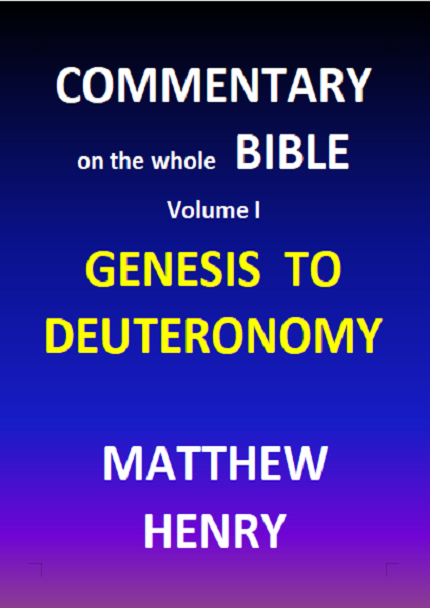Mathew Henry.

Commentary on the whole Bible.
Volume I
Genesis to Deuteronomy.
About Matthew Henry:
Matthew Henry (1662-1714) was an English Nonconformist minister and Bible commentator. He was born in a family of Puritan ministers and received a religious education from his father, Philip Henry.
Matthew Henry began preaching at the age of 23 and was ordained in 1687. He served as a pastor of a Presbyterian congregation in Chester and later in London.
Matthew Henry is best known for his famous commentary on the whole Bible, which was first published in 1706. This work is still widely used by Christians of many denominations today. It is highly regarded for its clear and concise explanations of the text, as well as its practical applications for daily life. Matthew Henry’s commentary is also notable for its emphasis on the spiritual and moral aspects of the Bible.
Matthew Henry died in 1714, at the age of 52, after falling ill while on a preaching tour. His commentary on the Bible has remained a popular and influential resource for over 300 years, and has been translated into many different languages.
What is a Bible Commentary?
A Bible commentary is a written interpretation and explanation of the Bible, typically organized book-by-book or chapter-by-chapter. A commentary is designed to provide readers with a deeper understanding of the text, including its historical, cultural, and literary contexts. It can also offer theological and practical insights for readers seeking to apply the text to their own lives.
Bible commentaries can be written by scholars, pastors, theologians, or other experts in biblical studies. They may draw on a range of sources, including biblical scholarship, historical and cultural information, and theological traditions. Commentaries may also provide comparisons and contrasts with other biblical texts, as well as analysis of important themes and motifs throughout the Bible.
Bible commentaries can be useful tools for individuals seeking to study the Bible in-depth, as well as for pastors and teachers preparing sermons and lessons. Some commentaries may be more technical or academic, while others may be geared toward a more general audience.
The Books of Moses: Genesis to Deuteronomy
The Bible books of Moses are the first five books of the Old Testament: Genesis, Exodus, Leviticus, Numbers, and Deuteronomy. These books are sometimes referred to as the “Pentateuch” or the “Torah” (which is the Hebrew word for “law”). According to Jewish and Christian tradition, these books were written by Moses, who is considered to be one of the leaders in Jewish history.
The book of Genesis tells the story of creation, the first human beings (Adam and Eve), and the early history of the world. It also recounts the lives of the patriarchs Abraham, Isaac, and Jacob, and the story of Joseph.
The book of Exodus tells the story of the Israelites’ liberation from slavery in Egypt and their journey to the Promised Land. It includes the Ten Commandments, given to Moses on Mount Sinai, and the construction of the Tabernacle, which was the center of Israelite worship.
The book of Leviticus contains laws and instructions for the Israelites’ worship and daily life, including rules for sacrifices, dietary restrictions, and regulations for priestly conduct.
The book of Numbers describes the Israelites’ journey through the wilderness, including their struggles with faith and obedience, and their arrival at the border of the Promised Land.
Finally, the book of Deuteronomy includes a restatement of the law and a call to obey it, as well as Moses’ farewell address to the Israelites before his death.